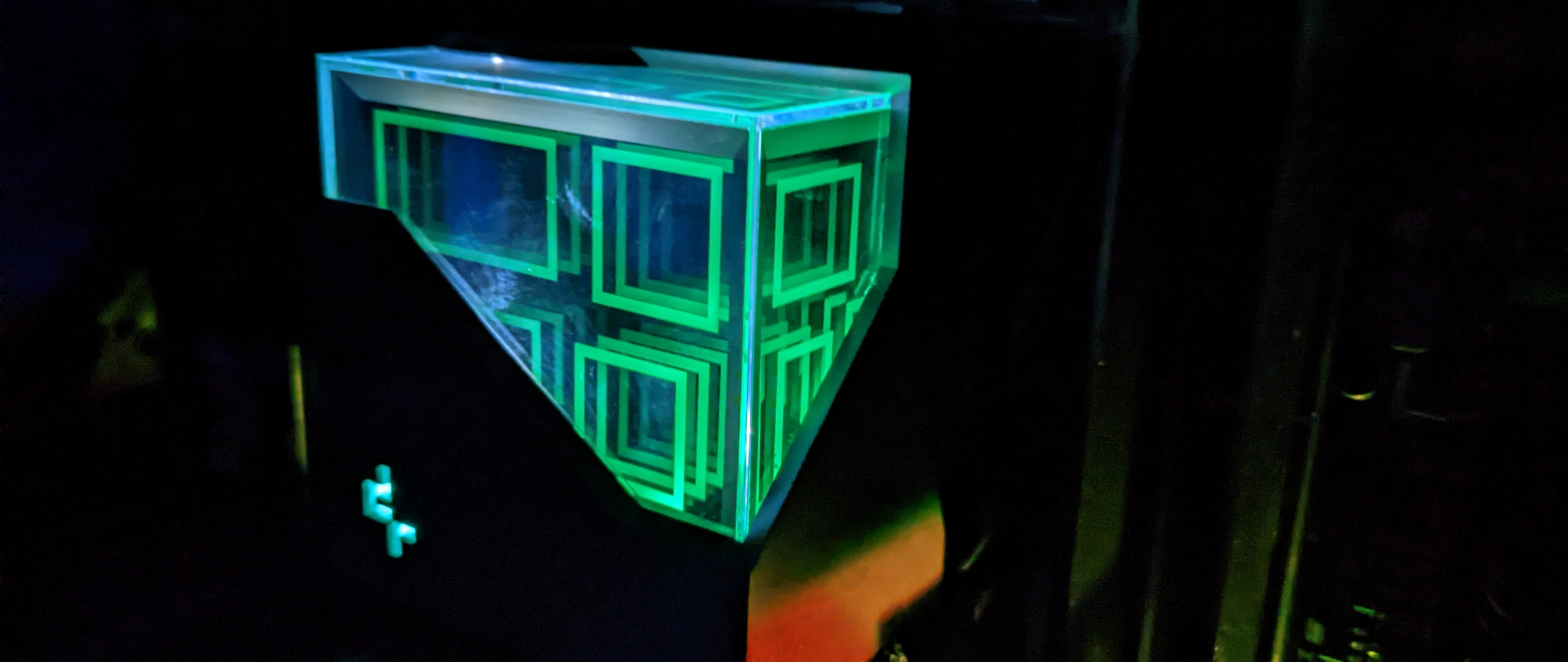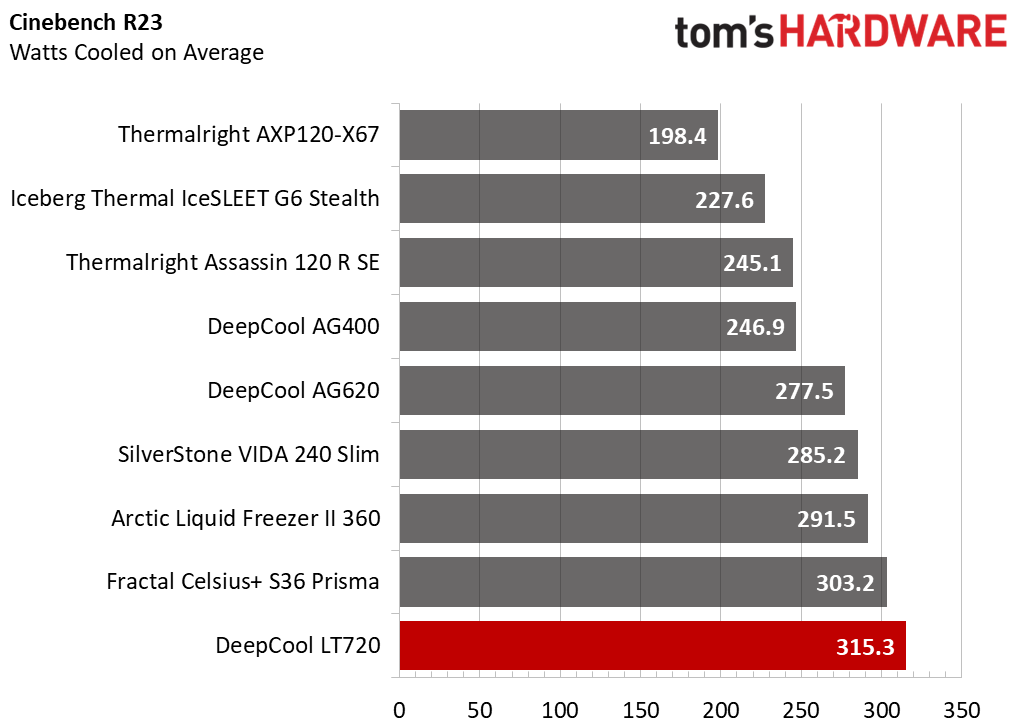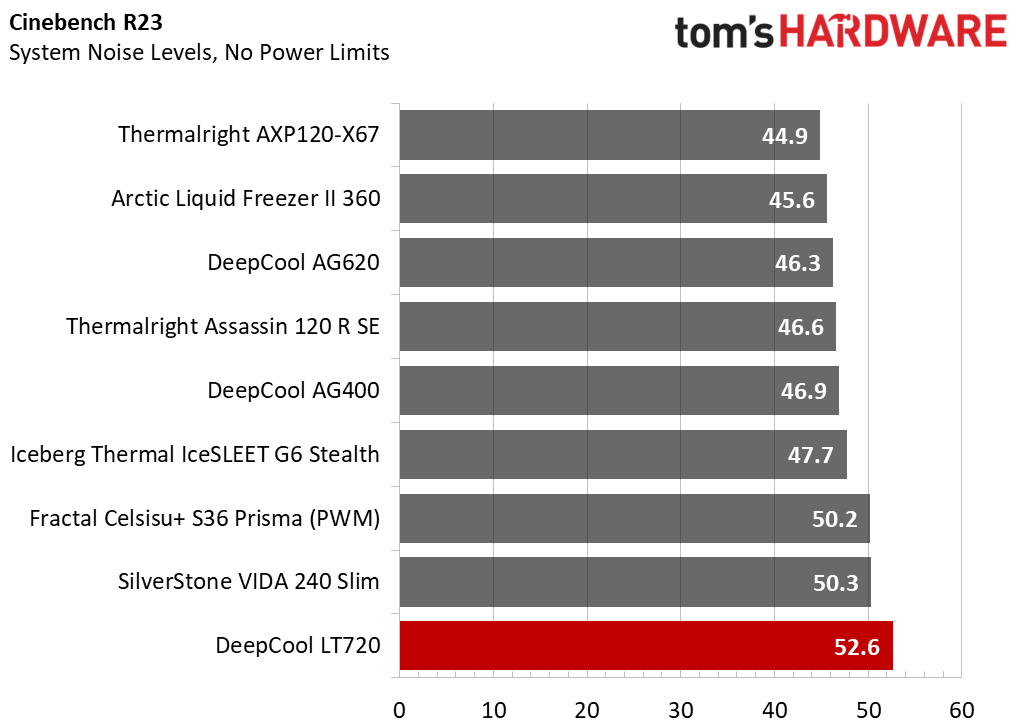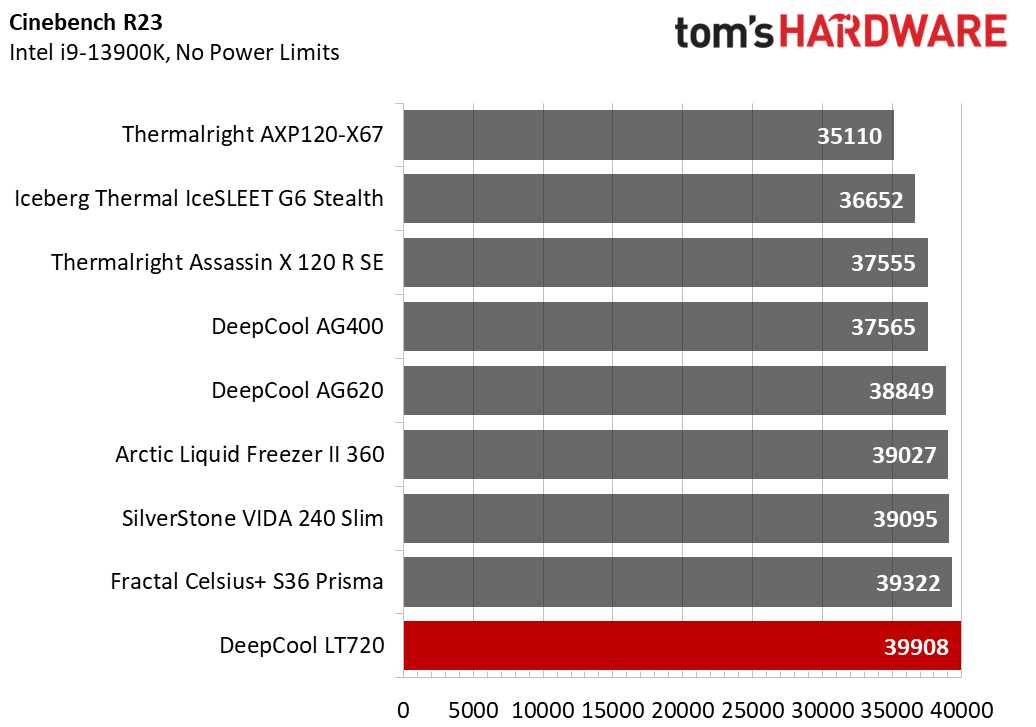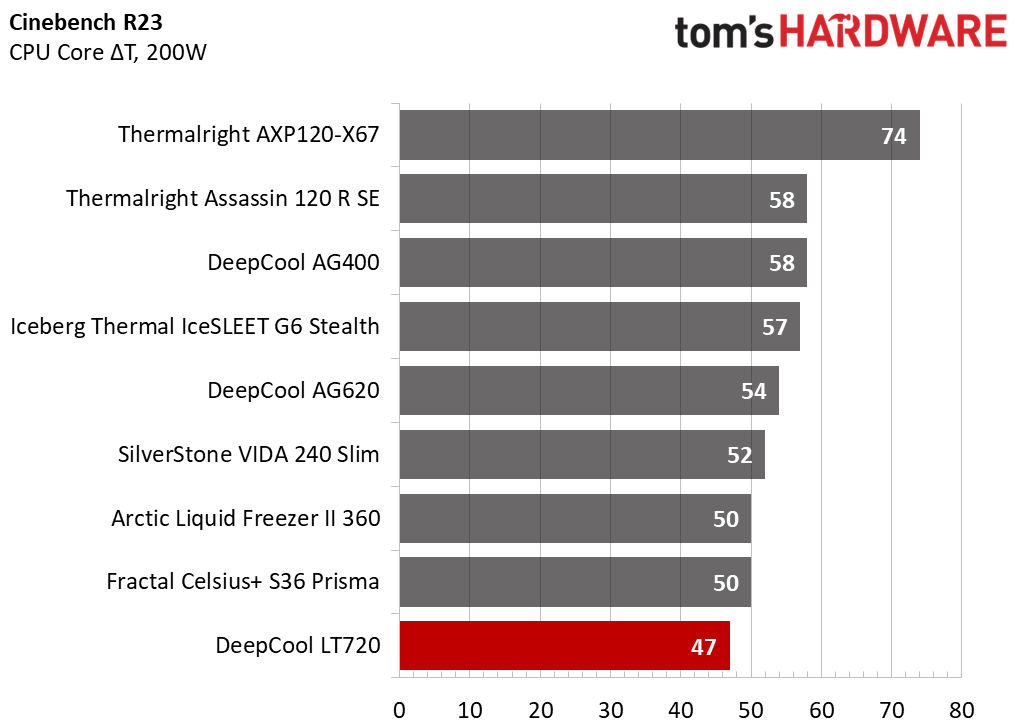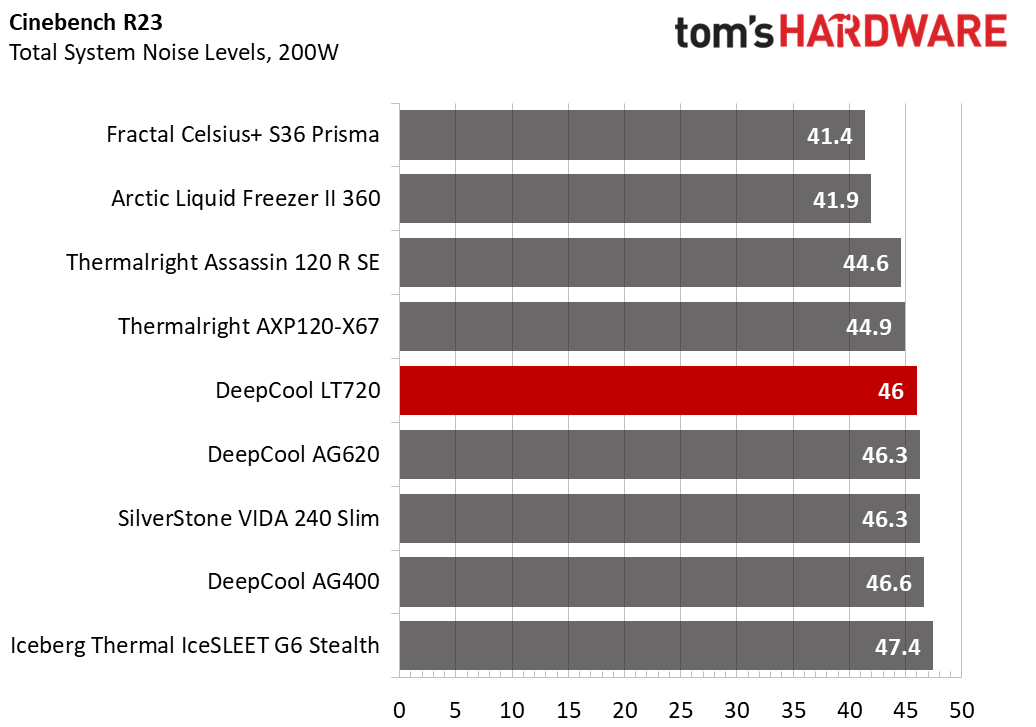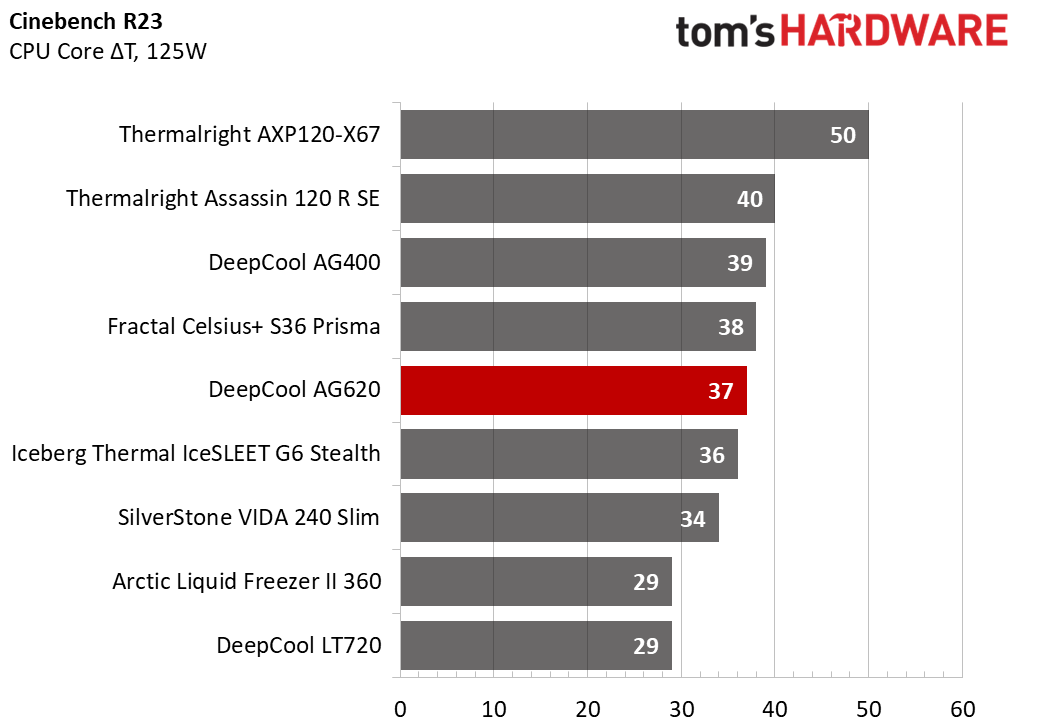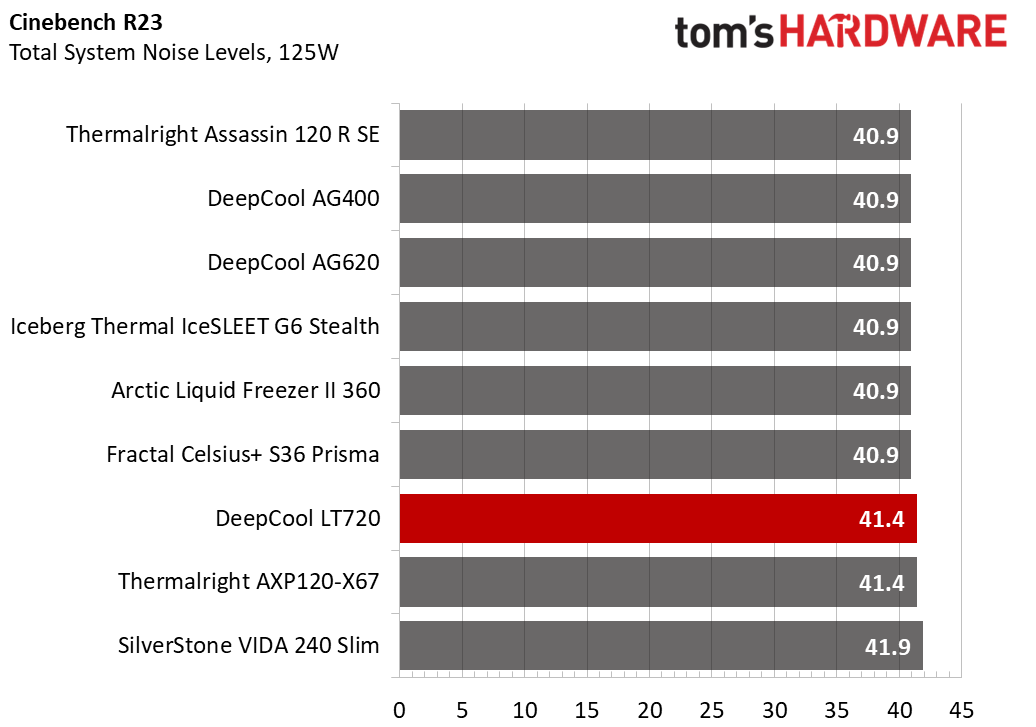Why you can trust Tom's Hardware
No Power Limits Cinebench Results
With Raptor Lake’s i9-13900K pushing speeds of 5.5ghz+, even the strongest of coolers hit TJ Max while running Cinebench R23 and other demanding scenarios. As the 13900K is designed to aim for its top safe temperature, we’ll be comparing the overall benchmark score and the CPU’s clock speeds instead.
The results below are for a 10-minute testing run. But to be sure that was sufficiently long to tax the cooler, we also retested both Thermalright’s Assassin X 120 R SE and DeepCool’s LT720 with a 30-minute Cinebench test. The results didn’t change much at all with the longer test: The average clock speeds maintained dropped by 29mhz on DeepCool’s LT720 and 31mhz on Thermalright’s Assassin X 120 R SE. That’s an incredibly small 0.6% difference in clock speeds maintained, a margin of error difference that tells us that the 10-minute tests are indeed long enough to properly test the coolers.
Because of the difficulty of cooling the i9-13900K in this workload, we feel the best way to compare coolers here is to record the average power consumption of the CPU. When it comes to total cooling capacity, DeepCool’s LT720 is the best-performing unit we’ve tested thus far, cooling an incredible 315W (avg) in this test.
As Cinebench R23’s multi-core benchmark will push coolers to their limits, it’s also a great test for recording the worst-case scenario of fan noise levels. You might notice that our noise charts start at 36dB - this is the noise floor of our testing environment. This makes 36dB our baseline measure, as we’re unable to measure noise levels below this threshold. Keep in mind that noise measurements are logarithmic, meaning the differences between the noise levels of the coolers will be bigger than these graphs would suggest.
While DeepCool’s LT720 has the best total cooling capacity of the units we’ve tested thus far, it achieves this at the cost of noise. When pushed to full fan speeds, the LT720 is the loudest CPU cooler we’ve recently tested.
We’re also looking at Cinebench R23 benchmark scores to show how little is lost – or gained – with different cooling solutions. Between the weakest and strongest coolers, there is a total benchmark score variance of 13.7%.
DeepCool’s LT720’s has the strongest cooling capacity of the coolers we’ve tested thus far with the 13900K, and as a result has the highest Cinebench R23 benchmark score recorded during our testing.
Get Tom's Hardware's best news and in-depth reviews, straight to your inbox.
200W Cinebench Results
When restricting power consumption to a more reasonable 200W, DeepCool’s LT720 continues to lead in overall thermal performance, with a 3 degrees Celsius lead over its closest competitor.
Looking at acoustic levels when restricted to 200W, DeepCool’s LT720 sits in the middle of the pack. Not too loud, but not silent either.
125W Cinebench Results
As with our unlimited and 200W testing results, the LT720 continues to hold the crown for best thermal performance in 125W workloads. The lowest power limit I test at is 125W, mainly because this is also the lowest level where I can reliably measure noise measurements. Lower power consumption causes the noise of the CPU cooler to fall below the noise created by the system fans (even while restricted to 35% speed).
When limited to 125W, the LT720’s fans run very quietly. However, the pump can be heard just barely over the sound of the system fans in this scenario, but this is due to my motherboard’s default settings which encourage higher pump speeds.
Conclusion
The LT720 is a great pairing for demanding CPUs like Intel’s i9-13900K. The refinements of DeepCool’s 4th generation, in-house, water pump design helps the LT720 to take the crown for total cooling capacity - the strongest of any unit I’ve tested thus far, cooling an average of 315W during Cinebench R23 tests. If you need a cooler that can handle the hottest of workloads, DeepCool’s LT720 can handle the heat.
- MORE: How to Buy the Right CPU Cooler
- MORE: How to Overclock a CPU
- MORE: How to Check CPU Temperature
- MORE: All CPU Cooling Content

Albert Thomas is a contributor for Tom’s Hardware, primarily covering CPU cooling reviews.
-
RichardtST That. Looks. Cool. I would almost consider buying Intel for my next build just to get one.... :)Reply -
thisisaname ReplyRichardtST said:That. Looks. Cool. I would almost consider buying Intel for my next build just to get one.... :)
It is also compatible with AMD so you do not have to buy Intel to use it :geek: -
Co BIY Why build the chips when the accessories are almost as expensive and probably cheaper to make ?Reply
Intel (and AMD) is leaving a lot of money on the table not bundling their own cooler. -
watzupken I actually feel that when testing this cooler, the stock mounting mechanism should have been used to demonstrate the out of box results.Reply -
helper800 The arctic freezer AIO looks like an overall winner for noise, performance, and temps at lower wattage draw. Its also significantly cheaper.Reply -
Eliad Buchnik It still can't beat the king (Arctic liquid freezer ii) when it comes to performance /noise ratio. I think you should do noise normalized testing at several noise levels to show which cooler is more effective and not brute-forcing its way to the top of the chart.Reply -
ReveurGAM Andrew, why do you insist on comparing cooler to those that are generally known to be weaker? You pulled the same rug over people's eyes with the PA120 SE. Stop making products look better than they are to the average consumer.Reply -
PC_Tweaker What a great article Andrew Thomas! I was leaning towards this purchase after my own research. Your detailed review pushed me over the edge as I replace my twice deceased ThermalTake TH240. That clunker is no friend to my i9 - I am eager to see how much better it works.Reply
I registered on this forum just so I could thank you for excellent article. -
postpro Got one on sale for my first PC build and I’m very happy with it. Quick and easy install on an i9-13900k with a Thermalright contact frame and haven’t heard the fans once, although I’ve only been gaming so far and haven’t pushed the CPU much for big renders and such.Reply
Also works with OpenRGB, though I’m guessing that’s because OpenRGB gets along with my mobo.
Thanks for the review, it helped me decide!
